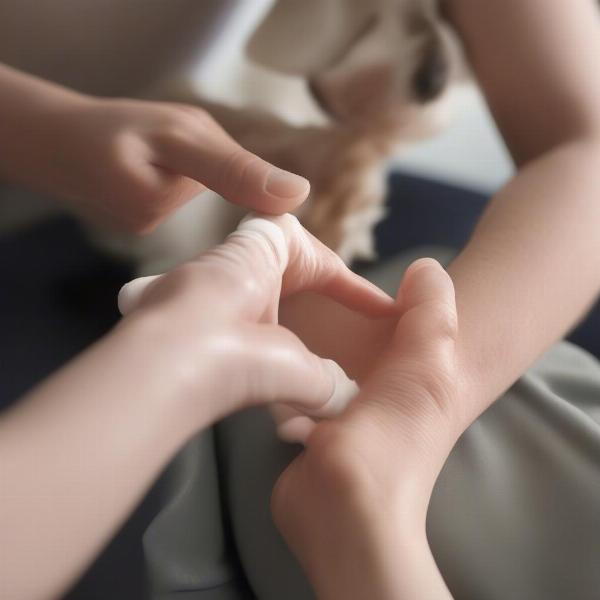Antibacterial creams can be a useful tool in your dog’s first-aid kit for treating minor skin wounds and infections. However, it’s important to understand when these creams are appropriate, which ones are safe for dogs, and how to use them correctly. This guide provides a comprehensive overview of antibacterial creams for dogs, helping you make informed decisions about your furry friend’s skin health.
Understanding the Need for Antibacterial Creams in Dogs
 Applying antibacterial cream to a dog's wound
Applying antibacterial cream to a dog's wound
Dogs, being naturally curious and active, are prone to minor cuts, scrapes, and abrasions. While most of these heal naturally, sometimes bacteria can enter the wound, leading to infection. Signs of infection include redness, swelling, pus, warmth, and pain. In such cases, antibacterial cream can help prevent the infection from worsening or spreading.
Choosing the Right Antibacterial Cream for Your Dog
Not all antibacterial creams are suitable for dogs. Some human creams contain ingredients that are toxic to dogs, such as xylitol. Always choose a cream specifically formulated for veterinary use. Look for creams containing active ingredients like chlorhexidine or silver sulfadiazine, known for their effectiveness against bacterial infections in dogs. Avoid using creams with steroids unless specifically prescribed by your veterinarian, as they can interfere with wound healing in certain cases.
Is a Natural Antibacterial Cream a Better Option?
Many pet owners prefer natural antibacterial solutions for their dogs. While some natural ingredients possess antibacterial properties, it’s essential to ensure their safety and efficacy for dogs. Consult your veterinarian before using any natural remedies, as some can be ineffective or even harmful. natural antibacterial for dogs provides more details on this topic.
How to Apply Antibacterial Cream to Your Dog
Before applying the cream, clean the wound gently with lukewarm water or a veterinary-approved antiseptic solution. Pat the area dry with a clean cloth. Then, apply a thin layer of antibacterial cream to the affected area. Avoid bandaging the wound unless instructed by your veterinarian, as some wounds heal better with exposure to air.
When to Consult a Veterinarian
While antibacterial creams can be effective for minor wounds, it’s crucial to consult a veterinarian if:
- The wound is deep or extensive.
- The wound is bleeding heavily.
- There are signs of a severe infection, such as excessive pus, fever, or lethargy.
- The wound doesn’t show signs of improvement within a few days.
- Your dog is licking or biting the wound excessively.
If you’re unsure whether an antibacterial cream is suitable for your dog’s condition, it’s always best to seek professional veterinary advice. For information on treating itchy skin in dogs, itchy skin cream for dogs might be helpful.
Conclusion
Antibacterial creams can be a valuable addition to your dog’s first-aid kit. By choosing the right cream and using it correctly, you can help prevent minor skin wounds from becoming infected. However, always remember to consult your veterinarian for any serious wounds or infections. Using antibiotic cream for dogs requires professional guidance. Understanding your dog’s individual needs and seeking professional advice when necessary is key to ensuring their overall health and well-being.
FAQ
- Can I use human antibacterial cream on my dog? No, it’s not recommended to use human antibacterial cream on dogs as some ingredients can be toxic.
- How often should I apply the antibacterial cream? Follow the instructions on the product label or your veterinarian’s advice.
- What should I do if my dog licks the cream off? Use an Elizabethan collar to prevent licking and consult your vet.
- Are there any side effects of using antibacterial cream on dogs? Some dogs might experience minor skin irritation. If you notice any adverse reactions, stop using the cream and contact your vet.
- Can I use antibacterial cream on a dog bite wound? Dog bite wounds require immediate veterinary attention. Do not apply any cream without consulting your vet.
- What are some signs that my dog’s wound is infected? Redness, swelling, pus, warmth, and pain are common signs of infection.
- Where can I find dog-specific antibacterial cream? You can find them at most pet stores or veterinary clinics. You can also find information on cream for dogs itchy skin.
ILM Dog is your trusted partner in providing comprehensive and reliable information on dog care and well-being. We offer expert advice on everything from breed selection and health care to training, nutrition, grooming, and much more. From puppies to senior dogs, we cover all aspects of canine companionship. For expert advice and guidance, contact us via email at [email protected] or phone at +44 20-3965-8624. ILM Dog is dedicated to helping you provide the best possible care for your beloved furry friend. Learn more about suitable dog anti bacterial cream by visiting our website.